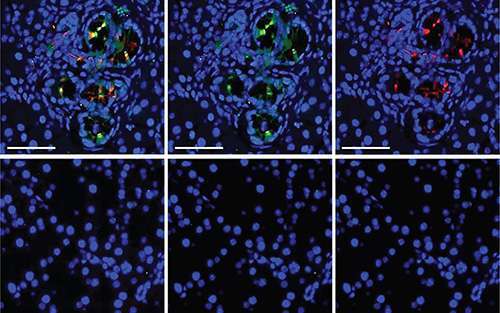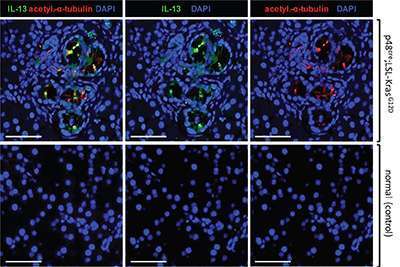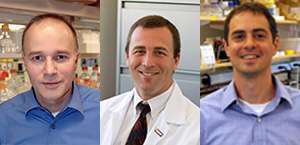
IL-13 in pancreatic tumors in mice
An all-star collaboration between three Pancreatic Cancer Action Network research grant recipients, representing three different institutions, has shown that immune cells, called “macrophages,” play an important role in the development and progression of pancreatic cancer.

Expression of IL-13 in pancreatic tumors in mice (top) and lack of expression in the healthy pancreas (bottom). Photo from Liou et al., 2017, Cell Reports 19, 1322–1333. © 2017 The Author(s).
Published on May 16 in Cell Reports, the study describes a protein, called interleukin-13 (IL-13), that gets released by precancerous cells of the pancreas – cells that are just beginning to take on early characteristics of cancer. One of the hallmark features of fully-developed pancreatic tumors is the presence of a dense, complex mix of cellular and tissue types known as the stroma.
In the study, senior author Peter Storz, PhD, and his colleagues across multiple institutions, present evidence that the release of IL-13 causes macrophages to behave abnormally. The rogue immune cells secrete factors that lead to the progression of precancerous cells into invasive cancer and to the recruitment of other cells to gather at the tumor site and form the stroma.
“We show that PanINs, precancerous lesions in the pancreas, secrete IL-13,” said Storz, associate professor of cancer biology and biochemistry and molecular biology at Mayo Clinic, Jacksonville, Fla. “The ‘alternatively-activated’ macrophages stimulated by IL-13 then promote tumor progression by supporting cancer cell growth and driving stroma formation.”
Importantly, the authors of the paper determined that neutralization of IL-13 – blocking its ability to bind to and activate macrophages – led to reduction of stroma and a slowing of pancreatic tumor growth in mice.

Left to right: Peter Storz, MD, David Dawson, MD, PhD, and Nabeel Bardeesy, PhD
“Next steps are to develop clinical trials to test blockade of IL-13 in combination with standard of care therapy,” Storz said.
Storz was the recipient of a 2008 PanCAN Career Development Award, funded in memory of Patty Boshell. For this paper, he collaborated with two fellow 2008 grantees – David Dawson, MD, PhD, at UCLA, and Nabeel Bardeesy, PhD, at Massachusetts General Hospital, whose grants were funded in memory of Seena Magowitz and Randy Pausch, PhD, respectively.
“My Career Development Award was the first grant I obtained as an independent researcher,” added Storz. “It allowed me to connect with other investigators in the field such as Dave Dawson and to establish a collaborative network.”
Help us continue to support leading-edge research projects like this to benefit pancreatic cancer patient outcomes.














